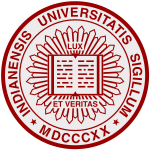
Back جامعة انديانا بلومينجتون ARZ Індыянскі ўніверсітэт у Блумінгтане Byelorussian ইন্ডিয়ানা বিশ্ববিদ্যালয় ব্লুমিংটন Bengali/Bangla Universitat d'Indiana Bloomington Catalan Indiana University Bloomington Czech Indiana University Bloomington German Indiania Universitato Bloomington Esperanto Universidad de Indiana Bloomington Spanish Indiana Ülikool (Bloomington) Estonian Indiana Bloomington Unibertsitatea Basque
 | |
| Latin: Indianensis Universitas | |
Former names |
|
|---|---|
| Motto | Lux et Veritas (Latin) |
Motto in English | "Light and Truth" |
| Type | Public research university |
| Established | January 20, 1820 |
Parent institution | Indiana University |
| Accreditation | HLC |
Academic affiliations | |
| Endowment | $3.32 billion (2021) (system-wide)[1] |
| President | Pamela Whitten |
| Provost | Rahul Shrivastav |
Academic staff | 2,149 (2014) [citation needed] |
| Students | 48,424 (fall 2024)[2] |
| Undergraduates | 36,833 (fall 2023)[2] |
| Postgraduates | 10,694 (fall 2023)[2] |
| Location | , , United States 39°10′02″N 86°31′17″W / 39.167222°N 86.521389°W |
| Campus | Small city[3] 1,937 acres (7.84 km2)[4] |
| Newspaper | Indiana Daily Student |
| Colors | Cream and crimson[5][6][7] |
| Nickname | Hoosiers |
Sporting affiliations | |
| Website | bloomington |
Indiana University Bloomington (IU Bloomington, Indiana University, IU, or simply Indiana) is a public research university in Bloomington, Indiana, United States. It is the flagship campus of Indiana University and its largest campus, with over 40,000 students.[8][9] Established as the state's seminary in 1820, the name was changed to "Indiana College" in 1829 and to "Indiana University" in 1838.
Indiana University is a member of the Association of American Universities and is classified among "R1: Doctoral Universities – Very high research activity".[10] Its schools and programs include the Jacobs School of Music, Kelley School of Business, School of Education, Luddy School of Informatics, O'Neill School of Public and Environmental Affairs, School of Public Health, School of Medicine, School of Nursing, Hutton Honors College, and Maurer School of Law.[11] The campus also features the Lilly Library, Eskenazi Museum of Art, and the Indiana Memorial Union.
Indiana athletic teams compete in NCAA Division I and are known as the Indiana Hoosiers. The university is a member of the Big Ten Conference. Since it does not have a mascot, all teams are known simply as "Hoosiers". The Indiana Hoosiers have won 24 NCAA national championships and one Association for Intercollegiate Athletics for Women (AIAW) national championship, in addition to 145 NCAA individual national championships. Titles won by teams include eight by the Hoosiers men's soccer team, a record-setting six straight in men's swimming and diving, five by the Hoosiers men's basketball team, three in men's cross country, one in men's track and field, and one in wrestling.
- ^ As of June 30, 2021. "Indiana University Endowment Among Top 20 Publics in Nation". Indiana University. Archived from the original on March 4, 2022. Retrieved March 24, 2022.
- ^ a b c "Enrollment up at IU campuses; Bloomington sets record for overall enrollment" (Press release). Indiana University.
- ^ "IPEDS-Indiana University Bloomington". Archived from the original on November 7, 2021. Retrieved November 7, 2021.
- ^ Cite error: The named reference
10Factbookwas invoked but never defined (see the help page). - ^ "The Origins of the IU Logo and Colors". August 18, 2017. Archived from the original on October 5, 2021. Retrieved October 5, 2021.
- ^ "IU Traditions – History – Cream and Crimson". Archived from the original on October 5, 2021. Retrieved October 5, 2021.
- ^ "Primary colors". Archived from the original on July 31, 2018. Retrieved July 31, 2018.
- ^ Cite error: The named reference
iubwas invoked but never defined (see the help page). - ^ "Enrollment Trends". Indiana University. Archived from the original on August 1, 2020. Retrieved January 4, 2020. As of Fall 2019, total enrollment in I.U. systemwide is 93,578, at I.U.Bloomington is 43,260, and at IUPUI (Indianapolis) is 29,537, making Bloomington the largest campus.
- ^ Cite error: The named reference
Carnegie Classifications Institution Profilewas invoked but never defined (see the help page). - ^ "Schools". Indiana University Bloomington. Archived from the original on September 28, 2012. Retrieved November 18, 2012.